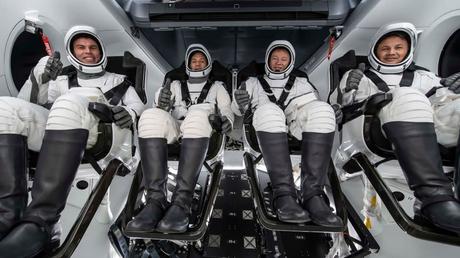A SpaceX rocket took off for the International Space Station on another groundbreaking mission conducted entirely by the private sector. On board are a group of European astronauts, including the first person from Turkey to visit space.
The mission is the latest in a series of private sector efforts - supported by NASA - aimed at boosting business activity in Earth's orbit. The United States has been striving for years to increase commercial activities in space, as NASA looks ahead to decommissioning the International Space Station and allowing private space stations to take over so the space agency can focus on missions deeper in the solar system, such as to the moon. and Mars.
The SpaceX Falcon 9 rocket was scheduled to launch on Wednesday, but the company was forced to postpone the mission as it worked to complete final checks before launch. Benji Reed, Space
The rocket finally lifted off from NASA's Kennedy Space Center in Florida at 4:49 PM ET Thursday. After reaching space, the Crew Dragon capsule detached from the Falcon 9 rocket and began navigating on its own, slowly approaching the space station. The Crew Dragon is expected to dock at the orbiting outpost early Saturday morning.
The four-man crew aboard Axiom-3, as this mission is called, includes Alper Gezeravcı - pronounced "Geh-zeh-rahv-juh" - a fighter pilot in the Turkish Air Force who is on his way to achieving a historic milestone to mark as Turkey's first citizen to reach low Earth orbit.
Also on board are Walter Villadei, a member of the Italian Air Force, and Marcus Wandt, who was selected as a member of the European Space Agency's astronaut reserve in 2022.
The story continues
Leading the trip is Michael López-Alegría, a former NASA astronaut who now serves as mission commander for Axiom Space, the Houston-based company that organized this trip with SpaceX and NASA.
Private versus government astronauts
Axiom's missions aim to offer flights to the International Space Station to anyone who can afford a ticket. The two previous Axiom missions - conducted in 2022 and 2023 - have carried a mix of wealthy businesspeople and astronauts whose governments paid for their seats.
Thursday's flight is the first Axiom mission where a government or space agency has purchased all the seats. In addition, each customer has a background as a military pilot, a profession in which many astronauts have entered.

The European Space Agency and the Swedish National Space Agency arranged Wandt's ticket. The Italian Air Force paid for Villadei's, and the Turkish government paid Gezeravcı's rate.
"I would like to underline how remarkably well prepared they are based on their background as military pilots with many, many years of operational experience," López-Alegría said at a news conference in December. "Very similar to some of the crews I was able to train with when I was a NASA astronaut."
The Axiom and SpaceX flights provide an alternate route to space for citizens and astronauts from countries that are not part of the routine crew rotation aboard the International Space Station, where crews are rotated approximately every six months. NASA has a separate deal - worth about $5 billion - with SpaceX for the flights that support these crew changes, and the space agency's hand selects which astronauts fly.
Axiom, on the other hand, organizes flights to the space station that last only a few weeks. Any individual or country can apply, and seats have been sold for $55 million each. (An Axiom executive declined to comment on pricing for this mission.)
Although ESA has agreements with NASA to fly European astronauts as part of the space station crew's normal rotation, this mission gave ESA the opportunity to secure an extra seat and commit some of its research to this short flight to add.
"This is also a first step for the European Space Agency to see how we can move into the post-ISS era," said Frank De Winne, head of ESA's European Astronaut Center in Cologne, Germany. "The ISS will come to an end one day."
The business model laid out by Axiom - founded by CEO Michael Suffredini, a former ISS program manager at NASA - is in line with the US space agency's current ethos for space exploration, which includes pushing private industry to invest in spaceflight and ultimately to develop a commercial space. station that could replace the aging International Space Station. The latter has been active for more than twenty years and could be decommissioned as early as 2030.
Axiom is one of many companies planning to eventually build its own private space station.
Research in space
The Axiom-3 crew is expected to spend 14 days on the space station, along with the seven astronauts already on board the laboratory.
The group will have "a full research suite, more than 30 experiments," Axiom President Matt Ondler said during a December news briefing about the mission. "The crew will be constantly engaged in experiments and research programs. In fact, we had more research than we could fit into the mission, which I think is a good example of how much demand there is."
The science includes research that will investigate how astronauts can predict whether they are at risk for motion sickness in space, studying lightning at the tops of clouds, testing for proteins linked to neurogenerative diseases such as Alzheimer's, and an experiment that will investigate how genetically edited plants respond in microgravity.
For more CNN news and newsletters, create an account at CNN.com
